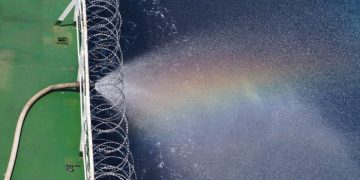Improved weather enables cleanup operations near BP refinery
Weather conditions improved enabling cleanup operations and assessment activities to progress near the BP Whiting Refinery in Whiting, Ind. High winds and heavy surf created unsafe conditions for contractors and assessment team personnel both Friday and Saturday, suspending activities. A Coast Guard helicopter returning from a separate mission conducted an overflight assessment of the area and did not observe any oil sheen on the water. The assessment team, comprised of representatives from the Coast Guard, the Environmental Protection Agency, and contractors from BP, resumed assessing the southeast rocky wall of the cove near the refinery to ensure remaining small areas of oiled pebbles were removed by cleanup crews. The assessment team also reinspected the beach area of the cove to ensure that no oil remnants had washed ashore as a result of heavy surf during the past two days. The walkthrough found no visible oil. With the improved surf conditions, members of the assessment team were able to get underway on a BP Fire Department boat to conduct a comprehensive survey of the path of discharge in search of potentially submerged oil. Other members waded into the water closer to shore also conducting the submerged oil survey. After taking more ...
Read more


















































